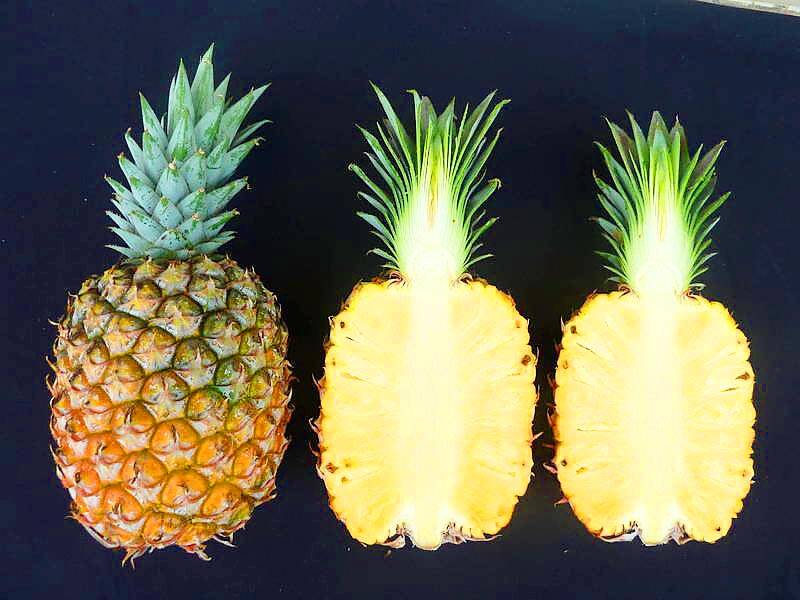Council of Agriculture Deputy Minister Chen Junne-jih (陳駿季) yesterday accused China of “robbery and a complete disregard for the rule of law,” saying that Beijing began publicly promoting a patented pineapple cultivar stolen from Taiwan.
Chinese media said the developer of the fruit was the Chiayi branch of the council’s Agricultural Research Institute in the “Chinese region of Taiwan,” Chen told the Liberty Times (the Taipei Times’ sister newspaper).
In March 2021, Beijing banned imports of golden diamond pineapples from Taiwan under false pretenses and launched a massive promotion campaign for the fruit, which it was growing illegally in Guangdong Province, he said.

Photo courtesy of the Agricultural Research Institute
The Tainung No. 23 “mango pineapple” China is producing without authorization was a centerpiece of the council’s long-term fruit export plans, Chen said, adding that the patents for the cultivar were internationally recognized.
The theft means that the untold amount of money and years of agricultural research spent on creating the pineapple might not produce returns, he said.
Taiwan and China used to have a cross-strait plant patent work group, which the two countries founded together in 2010, Chen said.
In 2016, China abruptly ceased all communications, and did not respond to calls for cooperation, despite the council’s attempts to establish contact via non-governmental channels, he said.
The council has given four companies and three farming households authorization to grow the mango-flavored pineapple, with 25 hectares under cultivation this year, he said.
Citing Chinese reports, Chen said 66.7 hectares are being used to farm the cultivar in Hainan Province.
Fang Yi-tan (方怡丹), who heads the Chiayi branch of the Agricultural Research Institute, said that access to the cultivar was supposed to be heavily restricted, and an investigation into how China gained access to it is being conducted.
Taiwan could ask Japan to ban imports of the cultivar from China due to patent protections, she said.
Japan is the largest export market for Taiwanese pineapples and patent protections ensure that the market grows, Agriculture and Food Agency Director-General Hu Jong-i (胡忠一) said, adding that the council aims to export 20,000 tonnes of the fruit.
Local farmers are expected to grow about 383,000 tonnes of pineapples this year, he added.

Taiwan is stepping up plans to create self-sufficient supply chains for combat drones and increase foreign orders from the US to counter China’s numerical superiority, a defense official said on Saturday. Commenting on condition of anonymity, the official said the nation’s armed forces are in agreement with US Admiral Samuel Paparo’s assessment that Taiwan’s military must be prepared to turn the nation’s waters into a “hellscape” for the Chinese People’s Liberation Army (PLA). Paparo, the commander of the US Indo-Pacific Command, reiterated the concept during a Congressional hearing in Washington on Wednesday. He first coined the term in a security conference last

Prosecutors today declined to say who was questioned regarding alleged forgery on petitions to recall Democratic Progressive Party (DPP) legislators, after Chinese-language media earlier reported that members of the Chinese Nationalist Party (KMT) Youth League were brought in for questioning. The Ministry of Justice Investigation Bureau confirmed that two people had been questioned, but did not disclose any further information about the ongoing investigation. KMT Youth League members Lee Hsiao-liang (李孝亮) and Liu Szu-yin (劉思吟) — who are leading the effort to recall DPP caucus chief executive Rosalia Wu (吳思瑤) and Legislator Wu Pei-yi (吳沛憶) — both posted on Facebook saying: “I

The Ministry of Economic Affairs has fined Taobao NT$1.2 million (US$36,912) for advertisements that exceed its approved business scope, requiring the Chinese e-commerce platform to make corrections in the first half of this year or its license may be revoked. Lawmakers have called for stricter enforcement of Chinese e-commerce platforms and measures to prevent China from laundering its goods through Taiwan in response to US President Donald Trump’s heavy tariffs on China. The Legislative Yuan’s Finance Committee met today to discuss policies to prevent China from dumping goods in Taiwan, inviting government agencies to report. Democratic Progressive Party Legislator Kuo Kuo-wen (郭國文) said

The Ministry of Economic Affairs has fined Taobao NT$1.2 million (US$36,900) for advertisements that exceeded its approved business scope and ordered the Chinese e-commerce platform to make corrections in the first half of this year or its license would be revoked. Lawmakers have called for stricter supervision of Chinese e-commerce platforms and more stringent measures to prevent China from laundering its goods through Taiwan as US President Donald Trump’s administration cracks down on origin laundering. The legislature’s Finance Committee yesterday met to discuss policies to prevent China from dumping goods in Taiwan, inviting government agencies to report on the matter. Democratic Progressive Party